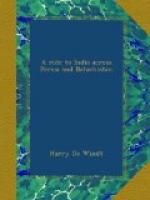The landing stage is crowded with passengers—a motley crowd of Russian officials, soldiers, peasants, and Tartars. With difficulty we struggle through the noisy, drunken rabble, for the most part engaged in singing, cursing, fighting, and embracing by turns, and succeed at last in finding our ship, the Kaspia, a small steamer of about a hundred and fifty tons burthen. The captain is, fortunately for us, sober, which is more than can be said of the crew. Alongside us lies the Bariatinsky, a large paddle-steamer bound for Ouzounada, the terminus of the Trans-Caspian Railway. She also is on the point of departure, and I notice, with relief, that most of the crowd are making their way on board her.
The passenger-steamers on the Caspian are the property of the Caucase-Mercure Company, a Russian firm. They are, with few exceptions, as unseaworthy as they are comfortless, which says a great deal. All are of iron, and were built in England and Sweden, sent to St. Petersburg by sea, there taken to pieces and despatched overland to Nijni-Novgorod, on the Volga. At Nijni they were repieced and taken down the Volga to the Caspian.
The Bariatinsky was first away, her decks crammed with soldiers bound for Central Asia. They treated us to a vocal concert as the ship left port, and I paced the moonlit deck for some time, listening to the sweet sad airs sung with the pathos and harmony that seems born in every Russian, high or low. I retired to rest with the “Matoushka Volga,” a boat-song popular the length and breadth of Russia, ringing in my ears.
There are no private cabins on board the Kaspia. I share the stuffy saloon with a greasy German Jew (who insists on shutting all the portholes), an Armenian gentleman, his wife, and two squalling children, a Persian merchant, and Gerome.
The captain’s cabin, a box-like retreat about eight feet square, leads out of our sleeping-place, which is also used as a drawing and dining-room. As the latter it is hardly desirable, for the German and Persian are both suffering violently from mal-de-mer before we have been two hours out, and no wonder. Though there is hardly a perceptible swell on, the tiny cock-boat rolls like a log. To make matters worse, the Kaspia’s engines are worked by petroleum, and the smell pursues one everywhere.
The passage from Baku to Enzelli (the port of Resht) is usually made in a little over two days in fine weather. All depends upon the latter, for no vessel can enter if it is blowing hard. There is a dangerous bar with a depth of barely five feet of water across the mouth of the harbour, and several Europeans, impatient of waiting, have been drowned when attempting to land in small boats. “I frequently have to take my passengers back to Baku,” said Captain Z—— at the meal he was pleased to call breakfast; “but I think we shall have fine weather to-morrow.” I devoutly hoped so.




